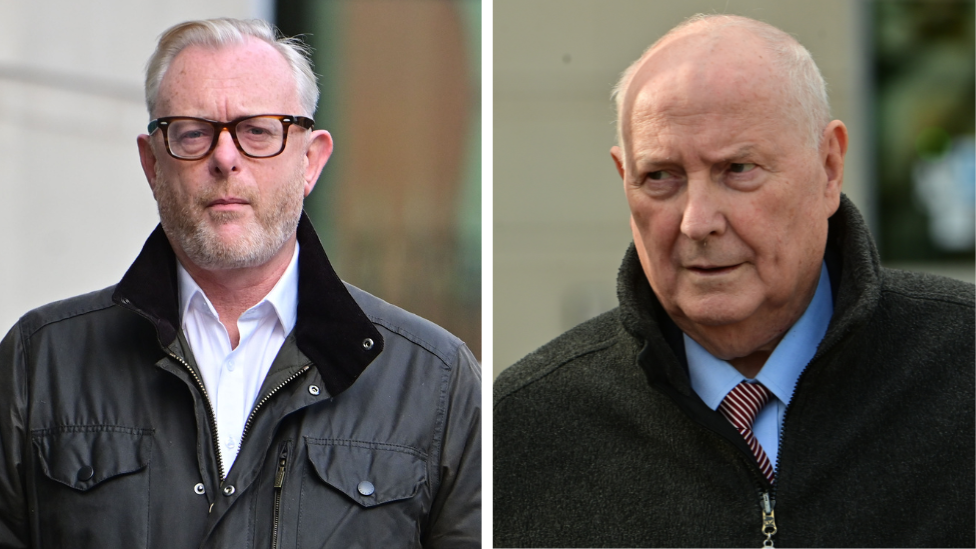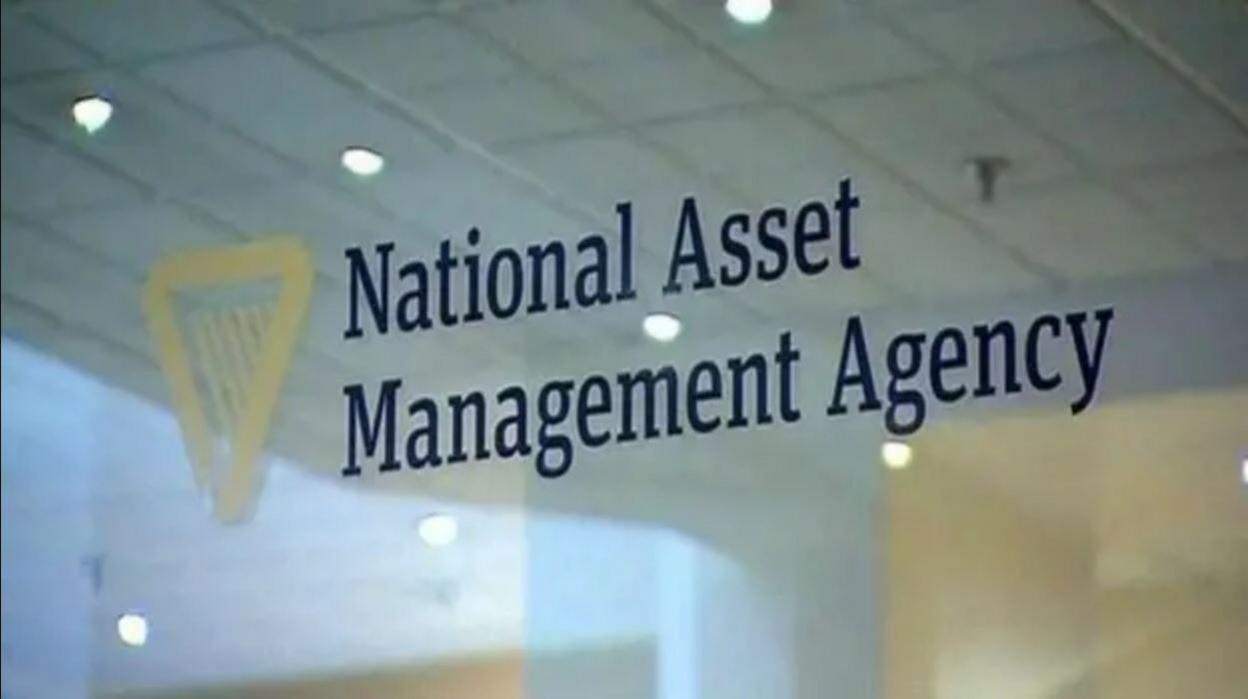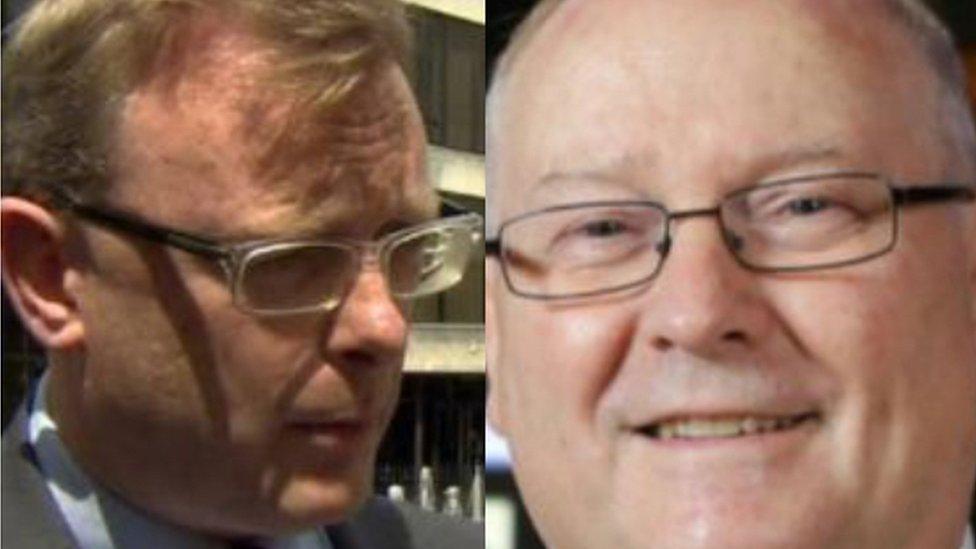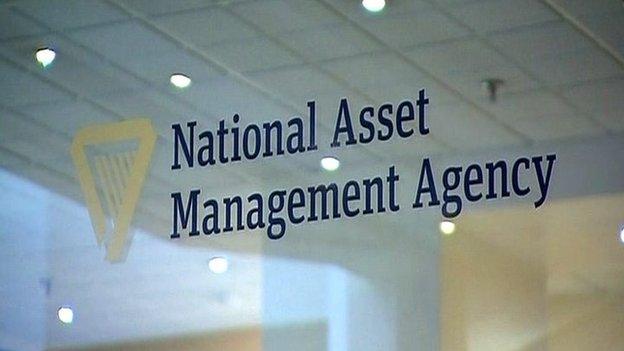Men accused of fraud linked to Nama were 'motivated by greed'

Ian Coulter (left) and Frank Cushnahan (right), pictured on Monday, have denied the charges
- Published
Two prominent businessmen who are accused of fraud in relation to a £1.1bn property deal were "motivated by greed", a court has heard.
Frank Cushnahan, 83, of Alexandra Gate, Holywood, denies two fraud charges.
Ian Coulter, 54, of Templepatrick Road, Ballyclare, denies five charges.
The charges relate to the sale of a loan book held by Ireland's National Asset Management Agency (Nama), more than 10 years ago.
Mr Cushnahan used to be an adviser to Nama, sitting on its Northern Ireland committee, and the court was told he was entitled to €1,000 (£873) for every meeting he attended.
Meanwhile, his former law firm partner, Mr Coulter, used to be the managing partner at Belfast-based Tughans law firm. He is now working for a different company.
A prosecution barrister told Belfast Crown Court on Monday that both Mr Cushnahan and Mr Coulter expected to be paid millions of pounds each as a "success fee" for the book's sale.
Nama defendents 'acted dishonestly'
Jonathan Kinnear KC said the purpose of Nama was to take over billions of property development debts held by banks in the Republic of Ireland.
Mr Kinnear said the charges against the defendants relate to the sale of about £4bn of those debts which were secured against property in Northern Ireland.
He said the £4bn package of debts was then sold for £1.1bn and that Mr Coulter and Mr Cushnahan were "heavily involved in the brokering and arrangement of that deal".
In return for their work, the court heard, both men were to be paid a success fee of about £15m.
"Motivated by greed they both acted dishonestly, withholding information and providing false information to ensure that they shared in the massive profits which were available," Mr Kinnear added.
Mr Coulter had bought a company in the Isle of Man, Mr Kinnear said, where he used a fraudulent invoice to extract £7.2m from Tughans.
He did this to "to launder his ill-gotten gains by removing them from Northern Ireland into a bank account only he had control over... with the intention thereafter of paying both Mr Cushnahan and himself", Mr Kinnear added.

Nama was set up by the Irish government to deal with toxic property loans after Ireland's banking crisis in 2008
Describing Mr Cushnahan to the jury, Mr Kinnear said he was a "well-known business figure" in Northern Ireland, who was trusted by many prominent politicians.
Because of this, in May 2010 he was appointed as an external member of the Nama Northern Ireland Advisory Committee (NIAC) - set up to advise how it might deal with property debts in Northern Ireland.
"As a member of that committee Mr Cushnahan was under a legal duty to disclose any conflict of interest that he had," the barrister said.
"We say in breach of this legal duty Mr Cushnahan secretly worked on a deal for the whole of the Northern Ireland loan book to be sold by Nama to an American fund called Pimco.
"The prosecution case is that without telling Nama he was involved with Pimco he provided assistance to Pimco in the expectation that he would receive a success fee of several million pounds."
After the deal with Pimco eventually fell through, Mr Kinnear said, a new buyer - another American fund called Cerberus - was found and the loan book was eventually sold for about £1.1bn.
"The prosecution's case is that Mr Cushnahan continued to help from the shadows and expected to receive his cut of the £15 million success fee," the court was told.
It was alleged that Mr Coulter had been introduced to the idea of the loan book being sold by Mr Cushnahan, and that the two defendants worked to persuade politicians in both the Republic and Northern Ireland the sale would be a "positive benefit to all".
Mr Kinnear said there was "nothing intrinsically wrong" with the principle of a success fee, but added: "It was the way in which these two defendants went about it and the way in which Mr Cushnahan did not reveal that he was involved in the deal to the entity which was selling the deal."
What is Nama?
Nama is the Republic of Ireland's "bad bank", set up by the Irish government in 2009 in the wake of the financial crisis which broke out the previous year.
Nama's role was to offload non-performing loans acquired from troubled banks.
Mr Cushnahan and Mr Coulter are both charged with fraud by false representation on or around 3 April 2014.
Mr Coulter faces a further four charges including transferring criminal property, namely money, between 15 September and 1 December 2014.
Between 1 April 2013 and 7 November 2013, Mr Cushnahan is accused of dishonestly failing to disclose information, that he was under a legal obligation to disclose to the Northern Ireland advisory committee and Nama.
He is accused of failing to inform them that he was providing information to a firm called Pimco over the proposed purchase of the Northern Ireland loan book from Nama.
It is alleged his intention was to make a gain for himself or someone else.
Both men deny all of the charges against them.
The 12-member jury, made up of nine men and three women, was sworn in last week.
The trial is expected to last up to 12 weeks.
The trial continues.
Related topics
- Published6 August 2020

- Published14 September 2016
